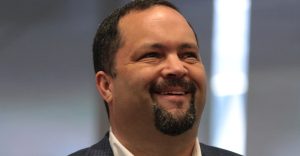Business
Lew Says Congress Should Turn Efforts Toward Business Taxes

In this Feb. 13, 2013, file photo, Jack Lew testifies at his confirmation hearing to be the new Treasury Secretary in Washington. (AP Photo/J. Scott Applewhite)
STEPHEN OHLEMACHER, Associated Press
WASHINGTON (AP) — The Obama administration is pushing Congress to simplify federal business taxes after Treasury Secretary Jacob Lew said Democrats and Republicans are too far apart to agree on sweeping changes to taxes paid by individuals and families.
Lew said the Obama administration has no interest in lowering the top income tax rate paid by individuals, a key goal for Republicans. He said there are more areas of agreement on business taxes.
“I don’t think that there’s any advantage in pretending that there aren’t big disagreements on the individual tax side,” Lew said at a forum hosted by the Brookings Institution, a Washington think tank. “We had a national debate just two years ago about the top rate. We’re not looking at the kind of negotiation to go back to lower the top rate.”
“While our views on individual tax reform may be far apart,” Lew added, “there is a broad set of business tax reforms on which we should be able to agree.”
Lew’s comments came after President Barack Obama proposed raising taxes on the rich and using some of the revenue to finance tax breaks for the middle class. In his State of the Union address this week, Obama called his approach “middle-class economics.”
Congressional Republicans panned the speech, saying there is no way they would use their majorities in the House and Senate to enact tax increases.
“This White House is more about redistribution and populist class warfare than about actual bipartisan tax reform,” said Sen. Orrin Hatch, R-Utah, chairman of the Senate Finance Committee.
Congressional Republicans said they were disappointed the Obama administration isn’t pushing to simplify taxes for individuals. They noted that the vast majority of small business owners report business income on their individual tax returns.
Still, key Republicans said they would welcome more talks about business taxes.
“We’re going to keep talking. We’re going to exhaust the possibilities of seeing where the common ground exists and see if we can get something done,” said Rep. Paul Ryan, R-Wis., chairman of the tax-writing House Ways and Means Committee.
“We do have big differences of opinion and our next step is to explore the areas of common ground if and where they exist,” Ryan said. “I’d like comprehensive tax reform and I think it’s important that you make sure that small businesses don’t fall by the wayside. And that is very important to us, and so we’ll see if we can complete the circle.”
Hatch and Sen. Ron Wyden of Oregon, the top Democrat on the Finance Committee, have formed five bipartisan working groups to work on various aspects of the tax code, with the goal of developing comprehensive legislation by the end of the year.
“I don’t want to just release a framework or a proposal that doesn’t go anywhere,” Hatch said in a speech this week. “My only goal when it comes to tax reform is to make new law.”
Democrats and Republicans alike agree that the nation’s tax laws are too complicated for businesses and individuals, filled with too many exemptions, deductions and credits. The tax code is so complex that most Americans pay someone to do their taxes or they buy commercial software to help them file.
There is also widespread agreement that lawmakers should eliminate some targeted tax breaks and use the extra revenue to lower tax rates for everyone. However, there is no consensus on which tax breaks should go and whose tax rates should be cut.
The top federal income tax rate for individuals and families is 39.6 percent. Some Republicans in Congress would like to lower it to 25 percent.
“I don’t think lowering the top individual rate is the way to grow our economy or create a better future for middle-class workers or for the country at large,” Lew said.
Obama released a framework for business tax reform in 2012. In it, he called for lowering the top corporate income tax rate from 35 percent — the highest in the industrialized world — to 28 percent. Obama would finance the cut by eliminating dozens of targeted tax breaks for corporations.
The corporate income tax, however, only affects a small percentage of American businesses. More than 30 million tax returns a year report business income. But in 2013, only 2.2 million were traditional corporations that paid the corporate income tax.
The overwhelming majority were sole proprietorships, partnerships and other corporations in which the owners report their business income on their individual tax returns. These businesses, known as pass-throughs, would not benefit from a cut in the corporate income tax rate.
Lew said Obama’s plan would help these businesses in other ways, such as easing accounting rules and enabling them to more quickly write off business expenses.
Key Republicans in Congress, however, are skeptical that Obama’s proposals would do enough to help small businesses.
“Let’s start the discussion on businesses, but it’s difficult to follow that all the way through without having a real adult conversation about individual rates because so many of our businesses are filing over there,” said Rep Kevin Brady of Texas, a senior Republican on the Ways and Means Committee.
___
Follow Stephen Ohlemacher on Twitter: http://twitter.com/stephenatap
Copyright 2015 The Associated Press. All rights reserved. This material may not be published, broadcast, rewritten or redistributed.
Alameda County
Seth Curry Makes Impressive Debut with the Golden State Warriors
Seth looked comfortable in his new uniform, seamlessly fitting into the Warriors’ offensive and defensive system. He finished the night with an impressive 14 points, becoming one of the team’s top scorers for the game. Seth’s points came in a variety of ways – floaters, spot-up three-pointers, mid-range jumpers, and a handful of aggressive drives that kept the Oklahoma City Thunder defense on its heels.

By Y’Anad Burrell
Tuesday night was anything but ordinary for fans in San Francisco as Seth Curry made his highly anticipated debut as a new member of the Golden State Warriors. Seth didn’t disappoint, delivering a performance that not only showcased his scoring ability but also demonstrated his added value to the team.
At 35, the 12-year NBA veteran on Monday signed a contract to play with the Warriors for the rest of the season.
Seth looked comfortable in his new uniform, seamlessly fitting into the Warriors’ offensive and defensive system. He finished the night with an impressive 14 points, becoming one of the team’s top scorers for the game. Seth’s points came in a variety of ways – floaters, spot-up three-pointers, mid-range jumpers, and a handful of aggressive drives that kept the Oklahoma City Thunder defense on its heels.
One of the most memorable moments of the evening came before Seth even scored his first points. As he checked into the game, the Chase Center erupted into applause, with fans rising to their feet to give the newest Warrior a standing ovation.
The crowd’s reaction was a testament not only to Seth’s reputation as a sharpshooter but also to the excitement he brings to the Warriors. It was clear that fans quickly embraced Seth as one of their own, eager to see what he could bring to the team’s championship aspirations.
Warriors’ superstar Steph Curry – Seth’s brother – did not play due to an injury. One could only imagine what it would be like if the Curry brothers were on the court together. Magic in the making.
Seth’s debut proved to be a turning point for the Warriors. Not only did he contribute on the scoreboard, but he also brought a sense of confidence and composure to the floor.
While their loss last night, OKC 124 – GSW 112, Seth’s impact was a game-changer and there’s more yet to come. Beyond statistics, it was clear that Seth’s presence elevated the team’s performance, giving the Warriors a new force as they look to make a deep playoff run.
Activism
Oakland Post: Week of November 26 – December 2, 2025
The printed Weekly Edition of the Oakland Post: Week of November 26 – December 2, 2025

To enlarge your view of this issue, use the slider, magnifying glass icon or full page icon in the lower right corner of the browser window.
Activism
Oakland Post: Week of November 19 – 25, 2025
The printed Weekly Edition of the Oakland Post: Week of November 19 – 25, 2025

To enlarge your view of this issue, use the slider, magnifying glass icon or full page icon in the lower right corner of the browser window.
-

 Activism4 weeks ago
Activism4 weeks agoOakland Post: Week of November 12 – 18, 2025
-

 Activism3 weeks ago
Activism3 weeks agoIN MEMORIAM: William ‘Bill’ Patterson, 94
-

 Activism4 weeks ago
Activism4 weeks agoHow Charles R. Drew University Navigated More Than $20 Million in Fed Cuts – Still Prioritizing Students and Community Health
-

 Bay Area4 weeks ago
Bay Area4 weeks agoNo Justice in the Justice System
-

 #NNPA BlackPress3 weeks ago
#NNPA BlackPress3 weeks agoLewis Hamilton set to start LAST in Saturday Night’s Las Vegas Grand Prix
-

 #NNPA BlackPress2 weeks ago
#NNPA BlackPress2 weeks agoBeyoncé and Jay-Z make rare public appearance with Lewis Hamilton at Las Vegas Grand Prix
-

 Activism2 weeks ago
Activism2 weeks agoOakland Post: Week of November 19 – 25, 2025
-

 #NNPA BlackPress4 weeks ago
#NNPA BlackPress4 weeks agoThe Perfumed Hand of Hypocrisy: Trump Hosted Former Terror Suspect While America Condemns a Muslim Mayor



























































